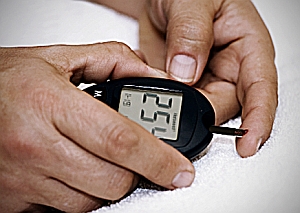Researchers at Joslin Diabetes Center, affiliated with Harvard Medical School in Boston, found the arthritis drug salsalate helps lower blood glucose levels and improves control of blood sugar among people with type 2 diabetes. Results of the clinical trial, which included researchers from several other universities and hospitals, appear in today’s issue of the journal Annals of Internal Medicine (paid subscription required).
Salsalate is an established nonsteroidal anti-inflammatory medication prescribed to relieve pain and inflammation from rheumatoid and other forms of arthritis. The compound is now a generic drug and no longer available as a branded product. Steven Shoelson, a professor at Harvard Medical School and senior author of the paper, conducted earlier studies showing inflammation, like that afflicting arthritis sufferers, as a factor in the development of type 2 diabetes.
The study was the second part of a clinical trial testing salsalate against a placebo among 286 people with type 2 diabetes at 18 medical centers and three private practices in the U.S. Participants were randomly assigned to receive the drug (146) or a placebo (140), in addition to their current therapies, over 48 weeks. The first part of the trial evaluated various dosage levels of the drug.
After 48 weeks, patients taking salsalate had blood glucose levels some 37 percent lower than patients receiving the placebo. Patients in the salsalate group also had decreases in their fasting glucose concentrations averaging 15 milligrams per deciliter, and needed fewer additional medications to control their blood sugar, compared to the placebo participants.
The evidence was mixed on associated coronary measures. The salsalate recipinets had a 9 percent reduction in trriglycerides and a 27 percent increase in adiponectin, a protein that regulates metabolic processes including glucose levels. The salsalate group likewise had an 18 percent reduction in uric acid, associated with the progression of kidney disease. However, the salsalate patients also had modest increases in weight, LDL (“bad”) cholesterol, and urine albumin, an indicator of kidney damage.
The study’s first author, Allison Goldfine, is leading a follow-up trial to address concerns about salsalate on coronary functions. That trial will test salsalate on coronary artery plaque volume among patients with coronary artery disease. The results are expected to influence the drug’s submission to FDA as a type 2 diabetes treatment.
Goldfine and Shoelson tell more about the study in the following video.
- FDA Approves Type 2 Diabetes Drug, Orders More Studies
- Grant to Fund Glucose-Sensitive Insulin Development
- Asthma Drug Reveals Potential as Diabetes, Obesity Treatment
- Clinical Trial to Evaluate Type 2 Diabetes Treatments
- Trial to Test Cardiac Potential of Anti-Inflammatory Drug
* * *


 RSS - Posts
RSS - Posts
You must be logged in to post a comment.